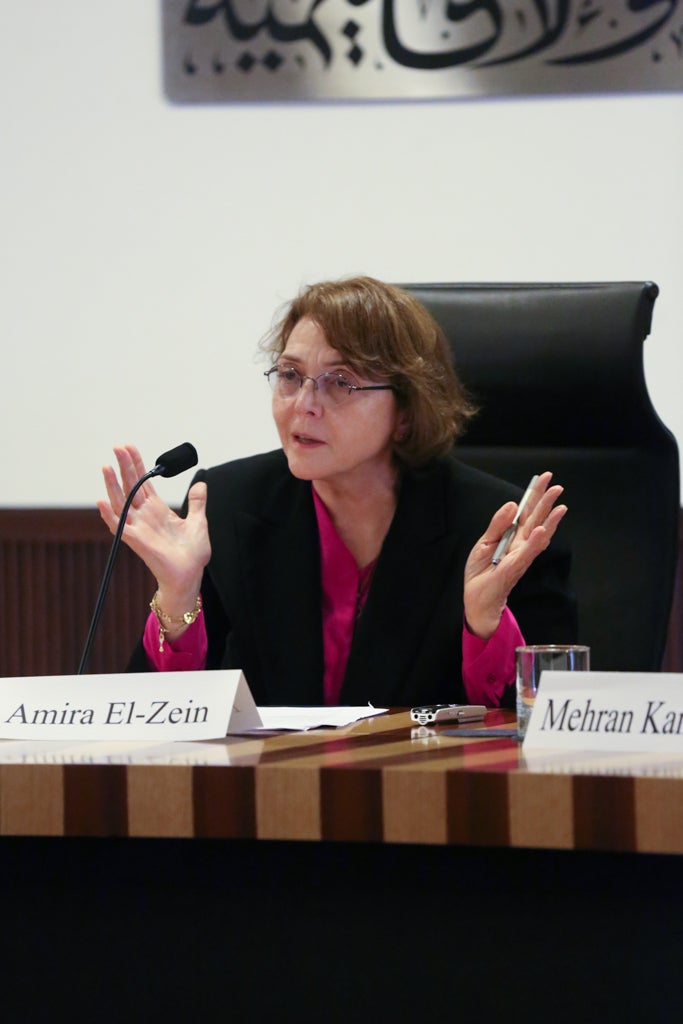Dialogue Series, Race & Society, Regional Studies
Victimization or Empowerment? The Case of Saudi Literature

Amira El-Zein, Associate Professor at the Georgetown University School of Foreign Service in Qatar and the 2014-2015 CIRS SFS-Q Faculty Fellow, delivered a CIRS Focused Discussion on “Victimization or Empowerment? The Case of Saudi Literature” on March 10, 2015. The lecture focused on several works authored by Saudi female novelists published outside of Saudi Arabia in places like Beirut, Casablanca, and Cairo. El-Zein examined works including Al-Firdaws Al Yabaab (The Barren Paradise) by Leila al-Juhni; Jahiliyyah (Ignorance) and Hind Wa L-Askar (Hind and the Soldiers) by Badriyyah al-Bishr; and Tawq Al Hamam (The Dove’s Collar) by Raja Alem.
In recent years, Saudi Arabia has experienced an increase in female-authored literary fiction, despite the odds. These writings are significant, El-Zein explained, in their facility to carve a space, and indeed flourish, within highly restrictive cultural settings, or, what she calls, a “fundamentalist milieu.” Regardless of the fictive nature of the writing, these works can be considered contemporary cultural documents that question the rigid patriarchal system of knowledge upon which modern Saudi Arabia is founded.
Despite women’s general experiences of powerlessness within the institutional framework of modern Saudi Arabia, discourses about women take a paradoxically central role among the most powerful religious and political entities that all compete to be ordained as “the best supervisor of the moral order in the public sphere,” El-Zein said. In order to highlight these alternative literary testaments of Saudi Arabian life, she notes: “I analyze this conservative perspective through novels, as I consider them important accounts of the Saudi individual’s predicament in both the public and the domestic spheres.”
Through the intertextual juxtaposition of past and present, authors such as Raja Alem and Leila al Juhni situate modern Saudi Arabia within a historical continuum. The significance of this literary strategy alludes to the idea that seemingly entrenched contemporary ideologies have not always held sway, and that existing social, political, and religious infrastructures can be considered unstable and fleeting. In her work, “Alem’s message is that there have been periods of time when women in the kingdom were relatively better off than today, and when segregation between sexes wasn’t enforced as it is today,” El-Zein explained. By grounding contemporary political and religious infrastructures within a historical perspective, the authors reveal them to be brief moments in the long history of the civilization. Through such an empowering writing technique, the authors manage to destabilize contemporary power relations by suggesting that change is not only possible, but inevitable. El-Zein proposes that “through intertextuality, Alem and al-Juhni reclaim history and religion rather than attack them. They look at them, not as ideologies, but rather as emblematic institutions that have been manipulated as ideologies in order to maintain the existing powers.”
In conclusion, El-Zein illustrated how these texts are intricate and complicated, and proposed paying close attention to the novels in order to detect their many defiant qualities that are not immediately apparent. “A first reading of the texts,” she said, “unveils Saudi women as helpless and subdued, and concludes that these texts are victimization texts. A second close reading, however, that is more inquisitive and probing uncovers a different image, that of empowered women.”
Amira El-Zein is author of Islam, Arabs, and the Intelligent World of the Jinn and co-editor of Culture, Creativity and Exile. She translated several French authors into Arabic such as J.M.G Le Clézio, André Malraux, and Antonin Artaud. Her translation of the Palestinian poet, Mahmud Darwish, was nominated for the Pen International Prize of translation. Her poetry was chosen to be included in the United Nations’ Book of Poetry for 2015.
During her fellowship, El-Zein is working on a project titled, “Contemporary Saudi Literature: The Grueling Adaption to Modernity.” The research argues that contemporary Saudi literature conveys the dilemma of Saudi society torn between fascination with everything Western and obligations to unbending traditions. The question of tradition in its extremely arduous adaptation to rapid changes has led to a profound malaise, loss of identity, and confusion, which are characteristic of neocolonialism. The research will interpret several novels and poems that mirror the ordeals Saudi people experience when they challenge the harsh rules of the establishment. Comparisons will be made between Saudi literature and that written by other authors in the Gulf.
Article by Suzi Mirgani, Manager and Editor for CIRS Publications